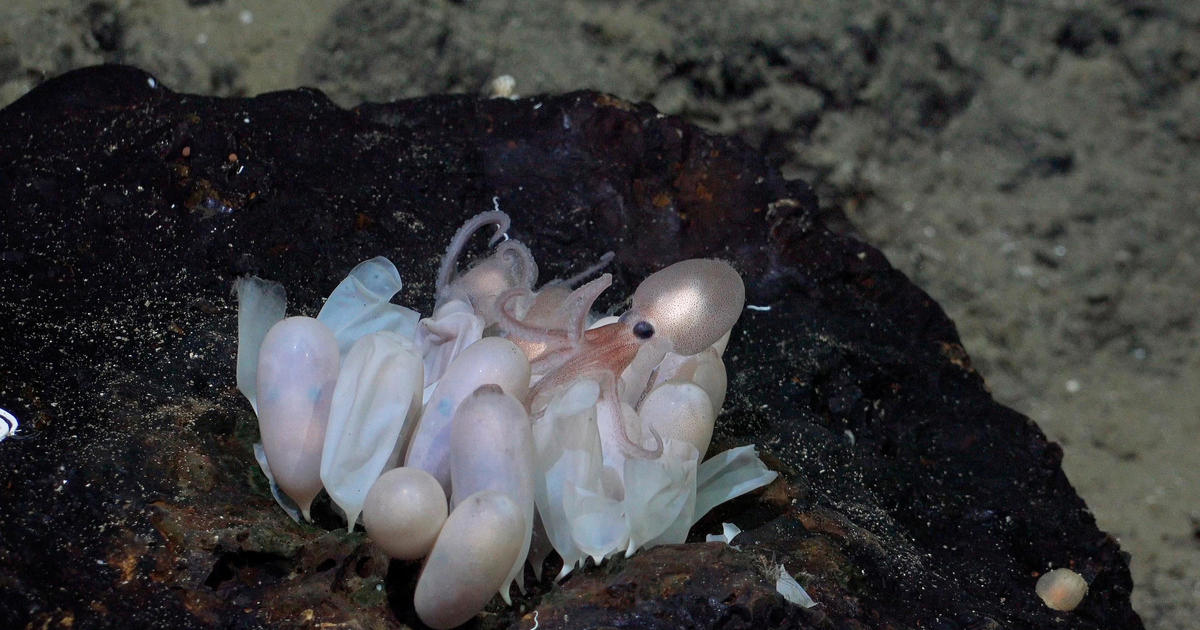CBS News
Ocean explorers discover 4 new species of deep-sea octopus, scientists say

A team of scientists has discovered four new species of octopus in the waters off Costa Rica, the Schmidt Ocean Institute said Tuesday.
So far, only one of the new species of deep-sea octopus has been named. All four new species, found in a 100-square-mile-sized area off Costa Rica, are in the process of being given formal scientific descriptions.
Schmidt Ocean Institute
The researchers are calling the named species the dorado octopus, named for an outcrop of rock where it was found known as El Dorado Hill. The dorado octopus is a new species of Muusoctopus, related to the pearl octopus, the researchers said.
Researchers found the octopus nursery off Costa Rica in 2013, but at the time, scientists said they didn’t see any developing embryos, which led them to believe conditions there were not conducive to the birth of baby octopuses. That changed last year when researchers returned to the area and saw octopuses hatch.
The team of scientists found two octopus nurseries in June and returned six months later to study the area further, according to the Schmidt Ocean Institute.
“Through hard work, our team discovered new hydrothermal springs offshore Costa Rica and confirmed that they host nurseries of deep-sea octopus and unique biodiversity,” Dr. Beth Orcutt of the Bigelow Laboratory for Ocean Sciences said. “It was less than a decade ago that low-temperature hydrothermal venting was confirmed on ancient volcanoes away from mid-ocean ridges. These sites are significantly difficult to find since you cannot detect their signatures in the water column.”
The dorado octopus was the only one of the newly discovered species that was seen brooding eggs at the area’s hydrothermal springs.
Brooding can last several years for an octopus, researchers said.
Schmidt Ocean Institute
Octopuses often brood in warm waters to reduce the amount of time it takes for the eggs to hatch.
Between the June and December expeditions, researchers collected more than 310 deep-sea specimens, according to the Schmidt Ocean Institute. They’re being archived at the Museum of Zoology at the University of Costa Rica.
Samples are usually sent to the U.S. or Europe, but housing the specimens in Costa Rica will allow local scientists to study them. The research could help inform future policies to protect local waters, Dr. Jorge Cortés of the University of Costa Rica said.
“I hope that the expedition serves as an inspiration for new generations,” Cortés said. “We need more international collaborations to advance knowledge of our deep-sea heritage.”
There are around 300 species of octopus worldwide, living in all of the world’s oceans.
— Li Cohen contributed reporting.
CBS News
Chinese trans woman awarded thousands over forced electroshock “conversion therapy” hopes for change

A transgender woman in China who recently won 60,000 yuan (roughly $8,300) in compensation from a hospital that forced her to undergo several rounds of electroshock “conversion therapy” has told CBS News that she hopes her experience will herald change for the LGBTQ+ community in her country.
“I hope that the transgender community will soon have safeguard measures and basic human rights, and will no longer be victimized by medical treatment,” said the 28-year-old performance artist who goes by the pseudonym Ling’er.
Ling’er
Ling’er was admitted to a hospital about a year after coming out to her parents as transgender, she previously told the U.K.’s Guardian newspaper. She said in that interview that her parents were “very opposed” to her gender identity and “felt that I wasn’t mentally stable. So they sent me to a mental hospital.”
In the hospital, Ling’er was diagnosed with an “anxiety disorder and discordant sexual orientation,” she told the Guardian. She said she was held for 97 days and subjected to seven sessions of electroshock treatment.
“It caused serious damage to my body,” Ling’er said. “Every time I underwent the treatment, I would faint… I didn’t agree to it, but I had no choice.”
Ling’er said the electric shocks caused her to develop heart problems, which she now requires medication to treat.
The hospital “tried to ‘correct me’, to make me conform to society’s expectations,” Ling’er told the Guardian.
The hospital declined to comment when approached by the Guardian.
There is a legal ambiguity surrounding so-called conversion therapy for LGBTQ people in China. The government removed homosexuality from an official list of psychiatric disorders in 2001, but a diagnosis for distress about sexual orientation remained on the books until recently.
A 2017 Human Rights Watch report urged the Chinese government to prevent hospitals and other medical facilities from subjecting LGBTQ people to conversion therapies. HRW said many victims of these therapies in China were forcibly brought to hospitals by their families.
“I feel good, I won my case,” Ling’er told CBS News. “I hope that my case will be useful for transgender cases in China.”
CBS News
Retail credit card interest rates hit all-time high

Watch CBS News
Be the first to know
Get browser notifications for breaking news, live events, and exclusive reporting.
CBS News
Menendez Brothers to appear in court in hearing that could bring them closer to release

Watch CBS News
Be the first to know
Get browser notifications for breaking news, live events, and exclusive reporting.




